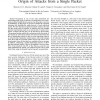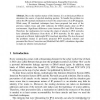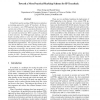166
click to vote
ICC
2011
IEEE
14 years 1 months ago
2011
IEEE
—Anonymity is one of the main motivations for conducting denial-of-service attacks. Currently, there is no mechanism to either identify the true source of an IP packet or to prov...
119
click to vote
TPDS
2008
15 years 1 months ago
2008
Tracing IP packets back to their origins is an important step in defending the Internet against denial-of-service (DoS) attacks. Two kinds of IP traceback techniques have been prop...
121
click to vote
IJSN
2007
15 years 1 months ago
2007
Tracing IP packets to their sources, known as IP traceback, is an important task in defending against IP spoofing and DoS attacks. Log-based IP traceback technique is to log pack...
114
click to vote
SIGCOMM
2010
ACM
15 years 2 months ago
2010
ACM
IP traceback can be used to find the origin of anonymous traffic; however, Internet-scale IP traceback systems have not been deployed due to a need for cooperation between Interne...
127
click to vote
EUROSEC
2008
ACM
15 years 3 months ago
2008
ACM
IP Traceback systems facilitate tracing of IP packets back to their origin, despite possibly forged or overwritten source address data. A common shortcoming of existing proposals ...
130
click to vote
CONEXT
2007
ACM
15 years 3 months ago
2007
ACM
Distributed Denial of Service (DDoS) attacks represent a serious threat to the appropriate operation of Internet services. To deal with this threat, we propose an IP traceback sys...
110
click to vote
EUC
2006
Springer
15 years 5 months ago
2006
Springer
Due to the stateless nature of the internet, it is an intricate problem to determine the source of spoofed attacking packets. To handle this problem we utilize the IP traceback mec...
105
click to vote
DISCEX
2003
IEEE
15 years 7 months ago
2003
IEEE
The design of the IP protocol makes it difficult to reliably identify the originator of an IP packet. IP traceback techniques have been developed to determine the source of large...
138
click to vote
BROADNETS
2006
IEEE
15 years 8 months ago
2006
IEEE
Probabilistic packet marking (PPM) has been studied as a promising approach to realize IP traceback. In this paper, we propose a new PPM approach that improves the current state o...
102
click to vote
CCS
2007
ACM
15 years 8 months ago
2007
ACM
The paper describes a Non-Intrusive IP traceback scheme which uses sampled traffic under non-attack conditions to build and maintains caches of the valid source addresses transiti...





